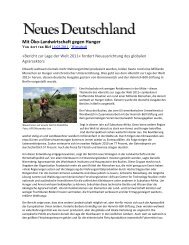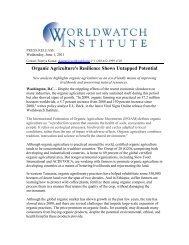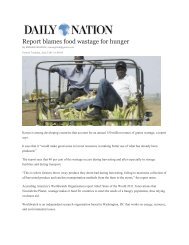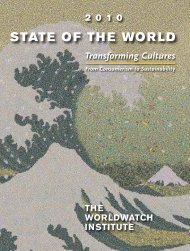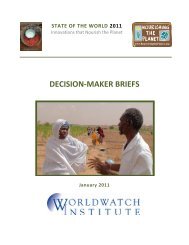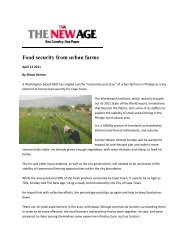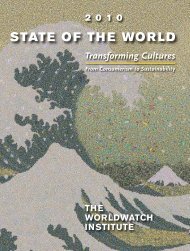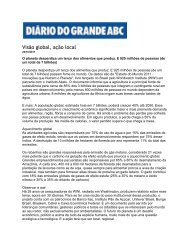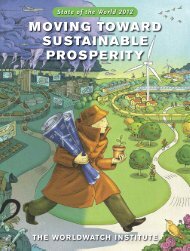Early Childhood Education to Transform Cultures for Sustainability
Early Childhood Education to Transform Cultures for Sustainability
Early Childhood Education to Transform Cultures for Sustainability
You also want an ePaper? Increase the reach of your titles
YUMPU automatically turns print PDFs into web optimized ePapers that Google loves.
<strong>Early</strong> <strong>Childhood</strong> <strong>Education</strong> <strong>to</strong> <strong>Trans<strong>for</strong>m</strong><br />
<strong>Cultures</strong> <strong>for</strong> <strong>Sustainability</strong><br />
Ingrid Pramling Samuelsson and Yoshie Kaga<br />
In view of the unprecedented challenges presented<br />
by continuing population growth, environmental<br />
destruction, and ever-shrinking<br />
resource availability, education at all levels<br />
should be reviewed <strong>to</strong> give a stronger focus on<br />
its role of promoting values, attitudes, practices,<br />
habits, and lifestyles that promote sustainability.<br />
As part of this ef<strong>for</strong>t, the education of<br />
children in their youngest years deserves special<br />
attention.<br />
Research shows that the human brain and<br />
biological pathways develop rapidly and that<br />
children’s experiences be<strong>for</strong>e they start primary<br />
school shape their attitudes, values, behaviors,<br />
habits, skills, and identity throughout life. Thus<br />
the first years of life provide a window of opportunity<br />
<strong>for</strong> nurturing children’s love of nature and<br />
the habits, practices, and lifestyles that favor<br />
sustainability. (See Box 6.) Basic life skills such<br />
as communication, cooperation, au<strong>to</strong>nomy, creativity,<br />
problem-solving, and persistence are<br />
acquired in these early years, and the motivation<br />
<strong>to</strong> learn is put in place. 1<br />
This is an ideal time <strong>to</strong> look at how <strong>to</strong> connect<br />
early childhood education programs <strong>to</strong> a<br />
sustainability agenda because these programs<br />
have increased dramatically in recent years, in<br />
part due <strong>to</strong> changing family structures and<br />
the increased number of women in the work<strong>for</strong>ce.<br />
About a third of young children in western<br />
industrial countries are now being looked<br />
after outside the home from the age of one or<br />
younger, and most children are in early childhood<br />
programs <strong>for</strong> at least two years be<strong>for</strong>e<br />
they start primary schooling. Between 1999<br />
and 2006, the global pre-primary percentage<br />
of children aged one <strong>to</strong> five who were enrolled<br />
in a kindergarten or the equivalent grew from<br />
33 <strong>to</strong> 40 percent. The share of children in<br />
such educational settings varies widely around<br />
the world, however. By 2006 the figures were<br />
14 percent in sub-Saharan Africa, 18 percent<br />
in the Arab states, 45 percent in East Asia and<br />
the Pacific, 65 percent in Latin America and the<br />
Caribbean, and 81 percent in North America<br />
and Western Europe. 2<br />
<strong>Early</strong> <strong>Childhood</strong> <strong>Education</strong><br />
Can Help Make the Shift<br />
<strong>Early</strong> childhood education can help build a<br />
culture of sustainability if it is framed in terms<br />
of sustainable development, if curriculum and<br />
pedagogical guidelines are oriented <strong>to</strong>ward<br />
Ingrid Pramling Samuelsson is a professor in early childhood education at Gothenburg University in<br />
Sweden. Yoshie Kaga is a program specialist in early childhood care and education at UNESCO.<br />
BLOGS.WORLDWATCH.ORG/TRANSFORMINGCULTURES 57



